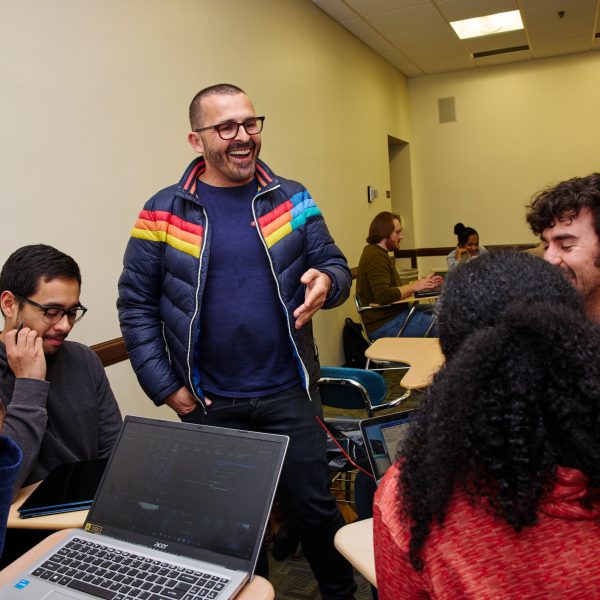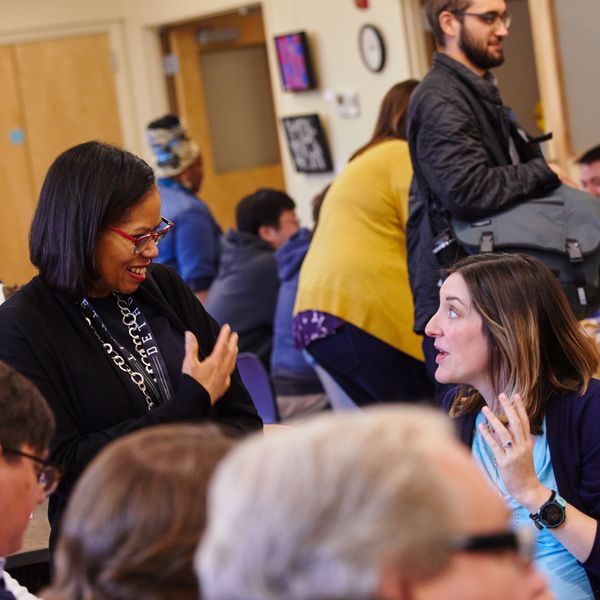What are Contextual Education Projects?
ConEd Project Proposal Worksheet
Contextual Education Projects are student-initiated, 1-semester-long projects that advance a student’s vocational discernment, professional development, and/or personal spiritual formation through faculty-supported, self-directed work.
All projects must be supervised by an STH faculty member who meets regularly with the student throughout the semester to support their progress through the project. Students will spend at least 240 hours during the course of one semester completing their project, and must track their hours to determine that this 240 requirement has been met so they can earn a full 3 units of credit for their project.
Students have completed a wide variety of Contextual Education Projects over the years. Students can “dream big” as to what they’d like their project to be. Projects should be customized toward each student’s own future vocational work, personal formational goals, and/or professional development plans. We invite students to begin by considering three questions:
- “If I had to spend 240 hours during the upcoming semester doing something to forward my professional development and/or personal spiritual formation, what would I want to do?”
- “Is there some aspect of my professional or spiritual development that is not being addressed by my seminary coursework? What am I not learning/doing yet, but I know that I need to learn/do to be successful in the future?”
- “Do I have all the professional skills and personal traits necessary to do the work I want to do in the future? If not, what is lacking, and how might I use my Contextual Education Project to move myself closer to that future?”
Once you’ve answered those questions, make a list of project ideas – things like your personal learning goals for the project, the tasks you’d like to complete, the real-life experience you’d like to gain, the leadership opportunities you’d like to have, and/or the outside-of-the-classroom learning you’d like to do. The four necessary qualities of a ConEd Project are:
-
Real-Life Contextual Learning
Much of the BUSTH curriculum takes place inside a classroom or doing required assignments, which are mostly reading/reflection/writing projects. Contextual Education asks you to step outside of this traditional curricular model. ConEd Projects should be developed to include real-world learning and leadership practice, as well as opportunities for networking with individuals and institutions beyond just the seminary context.
-
Personal and/or Professional Development
Think about what you need to learn or do to take the next steps in your professional career or personal development. Then consider how those things might become part of your semester-long ConEd Project. Some ideas include learning a new skill, interviewing people in your field of interest, attending networking opportunities, attending a retreat or workshop series, developing new spiritual life practices, attending denominational/religious events, or volunteering with an organization of interest – anything that will help you develop personally or professionally toward your future vocational goals.
-
Public Leadership Practice
Consider what public leadership in your professional field of choice looks like. For a future professor leadership might include things like teaching, curriculum development, or running a committee meeting. For a future pastor it might look like preaching, leading worship, creating a small group study, or organizing volunteers. For a non-profit leader, leadership might include community organizing, social media engagement, fundraising, and office administration. Whatever it is you want to do, ask yourself how you can add some of these public leadership practices to your ConEd Project.
-
At Least One “Deliverable”
Every project should include the production of at least one “deliverable,” that is, a tangible end product that can be presented in some public capacity. This deliverable will look different for each student, depending on what they and their faculty supervisor agree upon for their particular project. Some examples of acceptable deliverables include: a final presentation to a small group, leading a workshop or retreat, a social media series on the project, creation of a website based on the project, production of an annotated contacts list of everyone with whom you networked throughout your project, a published Op-Ed in local or national media, presenting at a conference, a curriculum or syllabus based on the project, a journal of personal theological reflection throughout the project, artistic expression such as a musical concert or gallery experience based on the project, a video travel log, a series of interview transcripts, a submitted book proposal or peer-reviewed journal submission – virtually anything that you and your faculty advisor believe culminates your project appropriately can be a deliverable. PLEASE NOTE: The final deliverable cannot be just another academic paper graded by the faculty member alone; there must be a public presentation component beyond the scope of just the faculty supervisor.
Once you have your list of ideas, determine whether it’s enough content to develop a 240-hour, semester-long project. If so, great! You can schedule a time with your prospective STH faculty project supervisor to run through your ideas and develop a final Project Proposal. However, if you aren’t ready to speak to a potential faculty supervisor just yet, you can always reach out to the Contextual Education Office and request a meeting with one of the Directors to help you develop your Project Proposal.
ConEd Project Proposal Worksheet
What is the process of getting a ConEd Project approved?
Students begin by identifying personal and professional goals for their project, then sketching out a draft of the Project Proposal Worksheet. They then share this proposal with the STH faculty member that they want to supervise their ConEd Project, and that faculty member approves the proposal. Once a student has the final draft of their Project Proposal complete, and an STH faculty member has agreed to be their supervisor, they may submit their proposal to the Contextual Education Office. They do this by uploading the Project Proposal as part of completing the online Placement/Project Request Form.
Once their Project Proposal is approved by the Contextual Education Directors, the ConEd Office communicates this by email to the student, the faculty supervisor, and the STH Registrar’s Office. This email of approval allows the student to register for their ConEd Project course using the code TC891 K1 (for fall projects) or TC892 K1 (for spring projects). Students can begin the work of their ConEd Project as soon as its semester begins, per the details laid out in their approved Project Proposal.
ConEd Project Proposal Worksheet
Who can pursue a ConEd Project?
All STH master’s-level students can pursue a Contextual Education Project at some point in their curriculum. Master of Theological Studies (MTS) and Master of Arts in Religion & Public Leadership (MARPL) students can use a ConEd Project to fulfill their programs’ ConEd core curricular requirement. Master of Divinity (MDiv) students can pursue a ConEd Project as an elective course only after fully completing their program’s six unit ConEd curricular requirement through either an internship placement or, if in the Chaplaincy Track, Clinical Pastoral Education (CPE). Master of Sacred Music (MSM) and Master of Sacred Theology (STM) students can pursue a ConEd Project as a free elective course at any point in their curriculum, with approval from their faculty advisor.
Are there any special considerations for International Students?
If an international student’s Contextual Education Project includes paid or unpaid work at an off-campus organization, they will need to complete a Curricular Practical Training (CPT) application with the University’s International Students and Scholars Office (ISSO), and will register one credit unit of their project under the School of Theology’s CT 800/801 course number. For example, for a three-credit-unit ConEd Project this would mean two units would be registered under TC 891 K1 (fall) or TC 892 K1 (spring) and one unit would be registered under CT 800 (fall) or CT 801 (spring).
That said, ConEd Projects also can be developed to not include any work hours outside of Boston University. In those cases, international students do not need to apply for CPT work authorization (so long as they do not exceed 20 hours of work per week), and all three of their project units will be registered under TC 891 K1 (fall) or TC 892 K1 (spring). If there is any question as to whether your ConEd Project Proposal will require CPT work authorization, please be in touch with the Contextual Education Office (sthope@bu.edu).
What are some examples of projects students have pursued?
Notice how each of these projects is very different, but specific to the vocational goals or interests of each student. Notice how they each drive the student beyond the typical seminary classroom experience into practices of leadership appropriate for their vocational field of interest. Notice how they each produced at least one tangible deliverable by the end of the project, and how they shared these publicly in some way. In this way, each of the projects below fulfills the four necessary qualities of a ConEd Project, as listed above.
Example One: A student interested in biblical archaeology visited several area museums and wrote personal reflections on their collection holdings, then contacted the four museum directors and interviewed them to ask about the museums’ provenance policies around ancient artifacts. The student then wrote their own philosophy of provenance for their resumé, and put together a syllabus as if they were proposing to teach a course in biblical archaeology that utilized field trips to the area museums. To complete the project, their deliverable was to take a group of people (friends & their STH faculty supervisor) to the museum to provide a personal tour of their favorite exhibit, providing commentary throughout the exhibit as if they were a professor taking their students on a field trip.
Example Two: A student who felt called to be a writer conceptualized, created, and led a writing group for a semester at STH. They attended a writer’s retreat put on by their denomination early in the semester to get their own personal writing goals in order. Then they spoke to STH colleagues, advertised the group via the STH newsletter and social media, and made an announcement at Community Lunch to recruit other students with similar interest in writing. They then arranged for the weekly writer’s group gatherings, including planning a good time, securing a room, and arranging for snacks. The writer’s group gatherings happened 6 times throughout the semester. The student created the weekly prompts that the participants used to do their writing, and facilitated the group’s sharing and critiquing one another’s writing at each meeting. At the end of the semester all of the participating students provided one piece of writing to include in a limited-run “zine” that was then distributed to the group members, their faculty supervisor, and others within the community.
Example Three: A student interested in community organizing volunteered several hours each week with GBIO – the Greater Boston Interfaith Organization – in their campaign for affordable housing. Their experience included door-to-door canvassing, attending GBIO public meetings, phone canvassing, and helping out at rallies and social actions. Once they got to know the organization a bit more, the student spent time interviewing GBIO-involved faith leaders about their own community organizing experience and how they include social justice advocacy in their local congregational ministries. The student kept a theological reflection journal throughout the semester, using it to take notes and reflect on their own experience of volunteering and learning how a faith-based social action non-profit organization runs. This was the deliverable they provided their faculty supervisor at the end of the project.
Example Four: A student curious about the phenomenon of “megachurches” created their own travel seminar road trip over spring break to visit several megachurches across the United States. They read books about megachurches ahead of time to deepen their knowledge of megachurch contexts, and interview several church leaders at the sites along their travels. They keep a combination video travel log/personal reflection log on a private social media channel during their travels, which helped them theologically reflect on their experiences along the way. When they returned, they created a slide deck and offered a presentation of their findings and impressions to a group of STH student friends, ConEd staff, and their faculty supervisor.
Example Five: A student who wants to be an historian did two ConEd projects in two subsequent semesters. In the first semester project they worked with a local church’s paper archives to digitize and catalog them on a cloud-based platform that the congregation could access (Google for non-profits). In their second semester project they designed and began an oral history project for the church. This included a new website in which they posted video oral histories of many of the congregations’ eldest members.
Do I have to find an STH faculty supervisor for my project?
Yes. All Contextual Education Projects must be supervised by an STH faculty member. Faculty involvement is for the sake of accountability, support, and the final evaluation of a student’s success in completing their project. The expectation is that the faculty supervisor will meet with the student at least five times (approximately 1-hour each time) throughout the semester, though they can meet with the student more often if they would like to do so. An outline of the five required meetings is as follows:
| Meeting 1: Developing & Approving the Project – To be completed a few months before the project semester begins |
During this initial meeting the student requests a faculty’s support as the supervisor for their project. At this meeting the student and faculty should agree on the scope of the project, its learning objectives, and its outcomes. These things (scope, objectives, outcomes) will be used by the student to complete their project proposal worksheet (this form) for submission to the Contextual Education Office by the appropriate deadline. |
| Meetings 2, 3, and 4: Project Check-ins – At regular intervals through the semester |
Conversations in which the faculty monitors the student’s project progress and provides space for professional and/or theological reflection and analysis. |
| Meeting 5: Final Meeting – Should happen sometime during the final two weeks of the semester |
Student should provide the faculty member their final project self-evaluation ahead of this meeting. This conversation will wrap up the semester, and faculty member will offer the student their final evaluation of the project’s success. The faculty will then email the Contextual Education Office with the student’s final evaluation and proposed final course grade. |
|
|
|
|
What if I can't find an STH faculty member willing to work with me on this project?
Be in touch with the Contextual Education Office with a brief summary of your project idea and request a meeting with one of the office’s directors. One of the Contextual Education directors (Rev. Dr. Anastasia Kidd or Rev. Nikki Renée) can serve as your faculty advisor for your project, if they have space in their schedule to do so.



